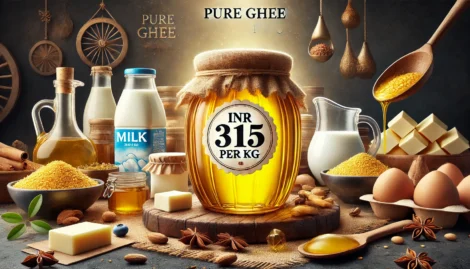- You have no items in your shopping cart
- Subtotal: ₹0.00

Tirupati Prasadam Controversy: FSSAI Issues Show-Cause Notice to AR Dairy Foods Over Ghee Contamination
Introduction:
A recent controversy has erupted surrounding the preparation of Tirupati laddus, one of the most sacred prasadam (offerings) at the Tirumala Venkateswara Temple in Andhra Pradesh. The Food Safety and Standards Authority of India (FSSAI) has issued a show-cause notice to AR Dairy Foods, a company responsible for supplying ghee used in the preparation of the laddus, after a food safety audit revealed that the ghee failed to meet several quality parameters.
The controversy has sparked concerns among devotees, given the importance of purity in religious offerings. This blog post delves into the details of the controversy, the FSSAI’s actions, and the significance of maintaining the sanctity and purity of prasadam.
FSSAI Issues Show-Cause Notice to AR Dairy Foods
The FSSAI conducted an audit of the ghee used in the Tirupati laddu, following allegations of adulteration and contamination. Their findings revealed that the ghee supplied by AR Dairy Foods did not meet the established quality standards. Consequently, the FSSAI issued a show-cause notice to the company, demanding an explanation for the substandard product and why appropriate actions should not be taken against them (Devdiscourse).
The FSSAI’s notice is part of a larger investigation that seeks to ensure that the sacred offering of Tirupati laddus is made with the highest quality ingredients, free from any contamination that could compromise the health of devotees or the spiritual significance of the prasadam.
Implications of the Contamination Allegations
The alleged contamination of the ghee used in Tirupati laddus has not only caused a stir among religious communities but also raised important questions about the quality control measures employed by suppliers. Since millions of devotees consume the laddu as part of their religious practices, it is imperative that the ghee used in its preparation is pure and of the highest quality.
Adulteration of food, particularly ghee, can lead to various health issues, including digestive problems and increased cholesterol levels. Furthermore, the religious significance of prasadam demands that it be free from any kind of contamination, as even minor impurities can be seen as disrespectful in the context of religious offerings .
AR Dairy Foods’ Response
AR Dairy Foods has come under scrutiny following the FSSAI’s show-cause notice. The company is expected to provide a formal response, detailing why their ghee failed to meet the FSSAI’s standards and what corrective measures they will take moving forward. The response from the company is awaited, and it remains to be seen how they will address the allegations of ghee contamination.
This incident highlights the importance of transparency and accountability in food production, particularly for companies supplying ingredients for religious and cultural offerings.
Maintaining Quality in Religious Offerings
In Hinduism, prasadam is not just food—it is a symbol of divine blessings. The preparation of Tirupati laddus involves strict rituals, and the ingredients used must adhere to the highest standards of quality. The recent allegations against AR Dairy Foods underscore the need for stringent quality control mechanisms for suppliers involved in the production of prasadam.
To maintain the sanctity of religious offerings, it is essential that:
- Quality checks are conducted at every stage of production.
- Suppliers are held accountable for any contamination or adulteration.
- Regulatory authorities, such as the FSSAI, continue to monitor and audit the food safety standards of companies involved in supplying ingredients for religious and cultural festivals.
GheeStore’s Pure Ghee: Lab-Certified for FSSAI Standards
At GheeStore, we take immense pride in ensuring the purity and quality of our ghee, which is lab-certified to meet FSSAI standards. Our ghee is crafted using the traditional Bilona method and is made from the milk of grass-fed cows, ensuring that you receive a product that is not only delicious but also free from harmful additives. Every batch undergoes rigorous testing, and our adherence to FSSAI food safety regulations guarantees that our ghee is pure, safe, and healthy. Whether you’re using ghee for religious purposes, cooking, or health benefits, GheeStore’s pure ghee ensures the highest standards of quality and transparency. Trust GheeStore for a product that is truly unadulterated and aligned with the strictest food safety protocols.
Conclusion: Ensuring Purity in Sacred Offerings
The recent show-cause notice issued by the FSSAI to AR Dairy Foods highlights the critical need for stringent quality control in the production of ingredients used in religious offerings. As the investigation continues, the FSSAI’s role in ensuring food safety and holding suppliers accountable is crucial to maintaining public trust, particularly when it comes to products consumed during religious rituals.
This incident serves as a reminder of the importance of purity in prasadam and the need for constant vigilance by both regulatory bodies and companies involved in the food supply chain.
For more details on this ongoing investigation, check the full articles on ANI News, The Hindu, and Indian Express.



